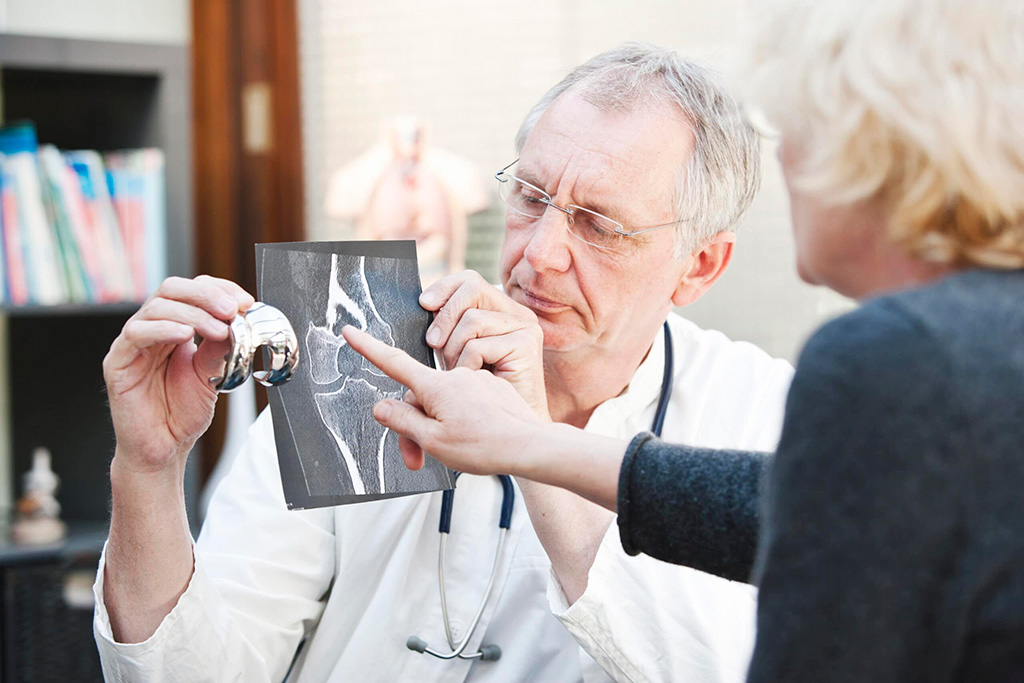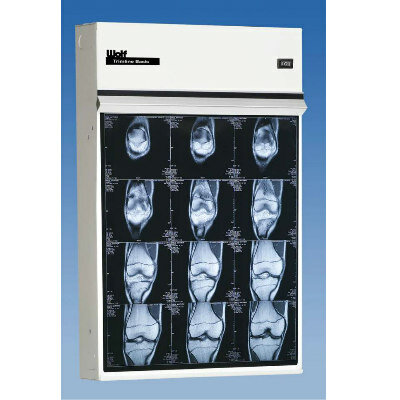TKA Postoperative Radiographs Hold Little Value
|
By MedImaging International staff writers Posted on 16 Sep 2021 |

Image: Radigraphs following knee replacement serve little purpose (Photo courtesy of Getty Images)
X-rays following primary total knee arthroplasty (TKA) result in considerable healthcare costs and unnecessary radiation burden, but offer very little clinical benefit, claims a new study.
Researchers at Harvard Medical School (HMS; Boston, MA, USA) and Brigham and Women's Hospital (BWH; Boston, AM, USA) conducted a retrospective study involving 1,258 adult patients who underwent primary TKA. Post-operative data were collected to determine frequency of radiograph series, radiograph findings that did not suggest normal healing or alignment, and changes in postoperative management. Total cost and radiation exposure values were calculated for all patient radiographs.
In all, 3,831 postoperative radiographs were taken; of these, 44 (1.1%) contained a positive finding, but only 13 (0.3% of all radiographs) of these were positive orthopedic findings, 11 of which led to changes in management. For all but one of these patients, these radiographs were taken during a non-routine postoperative visit. Overall cost of the routine postoperative radiographs that did not change clinical management was over one million USD, and administered 22.92 mSV of radiation to patients examined. The study was published on August 26, 2021, in Knee.
“Currently, there are no evidence-based guidelines describing when to order postoperative radiography after knee replacements, so orthopedic surgeons have historically relied on institutional norms to dictate when to order an x-ray,” concluded lead author Aseal Birir, MD, of HMS. “The findings support evidence that noncritical use of medical imaging is driving up healthcare costs and that more thoughtful use of imaging is needed to control these costs.”
TKA is an orthopedic surgical procedure where the articular surfaces of the knee joint--the femoral condyles and tibial plateau--are replaced. There is at least one polyethylene insert between the tibia and the femur that serves as a shock absorber; in 50% of the cases, the patella is also replaced in order to restore the extensor mechanism. The level of bone loss will dictate which kind of patella prosthesis is placed.
Related Links:
Harvard Medical School
Brigham and Women's Hospital
Researchers at Harvard Medical School (HMS; Boston, MA, USA) and Brigham and Women's Hospital (BWH; Boston, AM, USA) conducted a retrospective study involving 1,258 adult patients who underwent primary TKA. Post-operative data were collected to determine frequency of radiograph series, radiograph findings that did not suggest normal healing or alignment, and changes in postoperative management. Total cost and radiation exposure values were calculated for all patient radiographs.
In all, 3,831 postoperative radiographs were taken; of these, 44 (1.1%) contained a positive finding, but only 13 (0.3% of all radiographs) of these were positive orthopedic findings, 11 of which led to changes in management. For all but one of these patients, these radiographs were taken during a non-routine postoperative visit. Overall cost of the routine postoperative radiographs that did not change clinical management was over one million USD, and administered 22.92 mSV of radiation to patients examined. The study was published on August 26, 2021, in Knee.
“Currently, there are no evidence-based guidelines describing when to order postoperative radiography after knee replacements, so orthopedic surgeons have historically relied on institutional norms to dictate when to order an x-ray,” concluded lead author Aseal Birir, MD, of HMS. “The findings support evidence that noncritical use of medical imaging is driving up healthcare costs and that more thoughtful use of imaging is needed to control these costs.”
TKA is an orthopedic surgical procedure where the articular surfaces of the knee joint--the femoral condyles and tibial plateau--are replaced. There is at least one polyethylene insert between the tibia and the femur that serves as a shock absorber; in 50% of the cases, the patella is also replaced in order to restore the extensor mechanism. The level of bone loss will dictate which kind of patella prosthesis is placed.
Related Links:
Harvard Medical School
Brigham and Women's Hospital
Latest Radiography News
- Novel Breast Imaging System Proves As Effective As Mammography
- AI Assistance Improves Breast-Cancer Screening by Reducing False Positives
- AI Could Boost Clinical Adoption of Chest DDR
- 3D Mammography Almost Halves Breast Cancer Incidence between Two Screening Tests
- AI Model Predicts 5-Year Breast Cancer Risk from Mammograms
- Deep Learning Framework Detects Fractures in X-Ray Images With 99% Accuracy
- Direct AI-Based Medical X-Ray Imaging System a Paradigm-Shift from Conventional DR and CT
- Chest X-Ray AI Solution Automatically Identifies, Categorizes and Highlights Suspicious Areas
- AI Diagnoses Wrist Fractures As Well As Radiologists
- Annual Mammography Beginning At 40 Cuts Breast Cancer Mortality By 42%
- 3D Human GPS Powered By Light Paves Way for Radiation-Free Minimally-Invasive Surgery
- Novel AI Technology to Revolutionize Cancer Detection in Dense Breasts
- AI Solution Provides Radiologists with 'Second Pair' Of Eyes to Detect Breast Cancers
- AI Helps General Radiologists Achieve Specialist-Level Performance in Interpreting Mammograms
- Novel Imaging Technique Could Transform Breast Cancer Detection
- Computer Program Combines AI and Heat-Imaging Technology for Early Breast Cancer Detection
Channels
MRI
view channel
World's First Sensor Detects Errors in MRI Scans Using Laser Light and Gas
MRI scanners are daily tools for doctors and healthcare professionals, providing unparalleled 3D imaging of the brain, vital organs, and soft tissues, far surpassing other imaging technologies in quality.... Read more
Diamond Dust Could Offer New Contrast Agent Option for Future MRI Scans
Gadolinium, a heavy metal used for over three decades as a contrast agent in medical imaging, enhances the clarity of MRI scans by highlighting affected areas. Despite its utility, gadolinium not only... Read more.jpg)
Combining MRI with PSA Testing Improves Clinical Outcomes for Prostate Cancer Patients
Prostate cancer is a leading health concern globally, consistently being one of the most common types of cancer among men and a major cause of cancer-related deaths. In the United States, it is the most... Read moreUltrasound
view channel
Largest Model Trained On Echocardiography Images Assesses Heart Structure and Function
Foundation models represent an exciting frontier in generative artificial intelligence (AI), yet many lack the specialized medical data needed to make them applicable in healthcare settings.... Read more.jpg)
Groundbreaking Technology Enables Precise, Automatic Measurement of Peripheral Blood Vessels
The current standard of care of using angiographic information is often inadequate for accurately assessing vessel size in the estimated 20 million people in the U.S. who suffer from peripheral vascular disease.... Read more
Deep Learning Advances Super-Resolution Ultrasound Imaging
Ultrasound localization microscopy (ULM) is an advanced imaging technique that offers high-resolution visualization of microvascular structures. It employs microbubbles, FDA-approved contrast agents, injected... Read more
Novel Ultrasound-Launched Targeted Nanoparticle Eliminates Biofilm and Bacterial Infection
Biofilms, formed by bacteria aggregating into dense communities for protection against harsh environmental conditions, are a significant contributor to various infectious diseases. Biofilms frequently... Read moreNuclear Medicine
view channel
New Imaging Technique Monitors Inflammation Disorders without Radiation Exposure
Imaging inflammation using traditional radiological techniques presents significant challenges, including radiation exposure, poor image quality, high costs, and invasive procedures. Now, new contrast... Read more
New SPECT/CT Technique Could Change Imaging Practices and Increase Patient Access
The development of lead-212 (212Pb)-PSMA–based targeted alpha therapy (TAT) is garnering significant interest in treating patients with metastatic castration-resistant prostate cancer. The imaging of 212Pb,... Read moreNew Radiotheranostic System Detects and Treats Ovarian Cancer Noninvasively
Ovarian cancer is the most lethal gynecological cancer, with less than a 30% five-year survival rate for those diagnosed in late stages. Despite surgery and platinum-based chemotherapy being the standard... Read more
AI System Automatically and Reliably Detects Cardiac Amyloidosis Using Scintigraphy Imaging
Cardiac amyloidosis, a condition characterized by the buildup of abnormal protein deposits (amyloids) in the heart muscle, severely affects heart function and can lead to heart failure or death without... Read moreGeneral/Advanced Imaging
view channel
PET Scans Reveal Hidden Inflammation in Multiple Sclerosis Patients
A key challenge for clinicians treating patients with multiple sclerosis (MS) is that after a certain amount of time, they continue to worsen even though their MRIs show no change. A new study has now... Read more
Artificial Intelligence Evaluates Cardiovascular Risk from CT Scans
Chest computed tomography (CT) is a common diagnostic tool, with approximately 15 million scans conducted each year in the United States, though many are underutilized or not fully explored.... Read more
New AI Method Captures Uncertainty in Medical Images
In the field of biomedicine, segmentation is the process of annotating pixels from an important structure in medical images, such as organs or cells. Artificial Intelligence (AI) models are utilized to... Read more.jpg)
CT Coronary Angiography Reduces Need for Invasive Tests to Diagnose Coronary Artery Disease
Coronary artery disease (CAD), one of the leading causes of death worldwide, involves the narrowing of coronary arteries due to atherosclerosis, resulting in insufficient blood flow to the heart muscle.... Read moreImaging IT
view channel
New Google Cloud Medical Imaging Suite Makes Imaging Healthcare Data More Accessible
Medical imaging is a critical tool used to diagnose patients, and there are billions of medical images scanned globally each year. Imaging data accounts for about 90% of all healthcare data1 and, until... Read more
Global AI in Medical Diagnostics Market to Be Driven by Demand for Image Recognition in Radiology
The global artificial intelligence (AI) in medical diagnostics market is expanding with early disease detection being one of its key applications and image recognition becoming a compelling consumer proposition... Read moreIndustry News
view channel
Bayer and Google Partner on New AI Product for Radiologists
Medical imaging data comprises around 90% of all healthcare data, and it is a highly complex and rich clinical data modality and serves as a vital tool for diagnosing patients. Each year, billions of medical... Read more
















